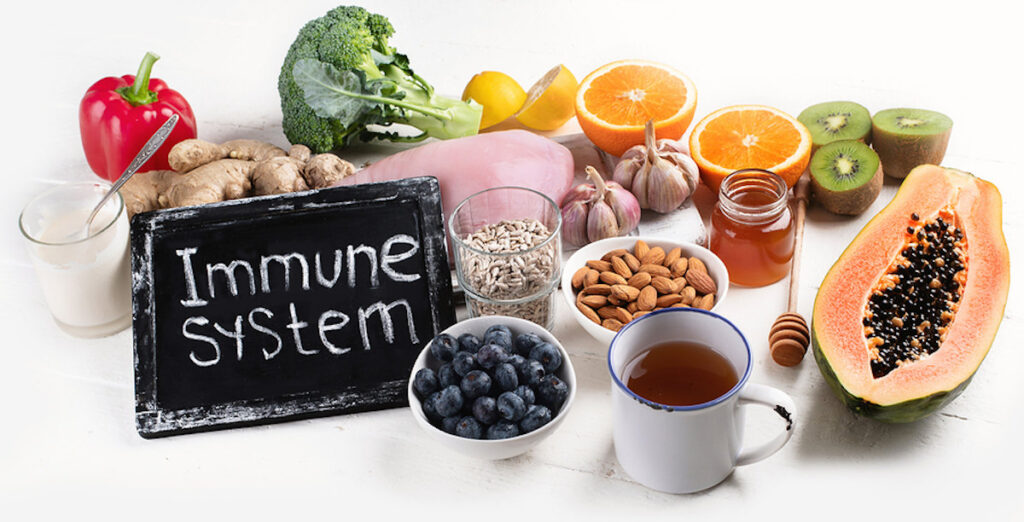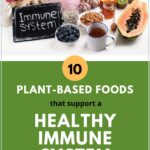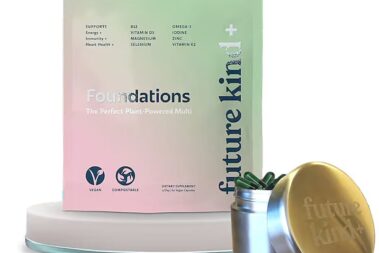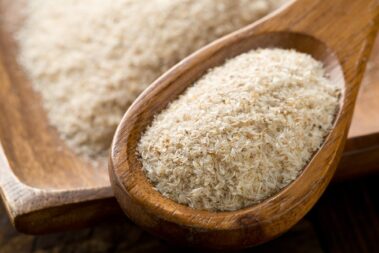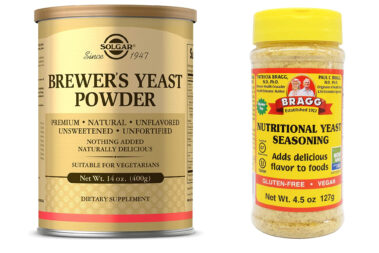Contrary to what you may be reading in certain dark corners of the internet, no single food, nutrient, or nutritional supplement has the ability to cure any disease or make you impervious to falling ill.
That said, eating a balanced and nutritionally complete diet can help ensure your immune system is in tip-top shape and ready for the challenge whenever one of those seasonal bugs does come knocking.
The trick is keeping your intake of whole, nutrient-dense foods consistent. An overall healthy dietary pattern that contains all of the calories, protein, and essential nutrients your body needs will have the greatest impact in terms of providing ongoing, long-term support for your immune system.
Thus, it’s critical that you’re paying attention to the foods you eat all year round—not just during cold and flu season.
If you’re not sure where to start, don’t fret. You’ve come to the right place.
This article will explore 10 examples of nutritious, plant-based foods that can be instrumental in supporting maintenance of a strong and healthy immune system.
Table of Contents
1. Dark Leafy Greens

“Eat your greens!” is probably one of the most consistent pieces of nutrition advice many people encounter throughout their lives—and for good reason.
There are countless benefits to be obtained from eating more dark leafy green vegetables, and immune support happens to be one of them.
Leafy green vegetables tend to be a rich source of a number of immune-supportive nutrients including vitamin C, folate, and iron.
Many of them also contain unique compounds that have been shown in preclinical experiments to stimulate the activity of specific types of immune cells located in your skin and digestive tract (1).
Kale, spinach, arugula, cabbage, collard greens, beet greens, and red leaf lettuce are all excellent options for boosting your intake of leafy green veggies.
For starters you can try adding finely chopped spinach or kale to soups, stews, and pasta sauces, or use gently steamed collard green leaves as a sandwich wrap. You can also use finely chopped greens to add bulk to grain bowls and smoothies.
2. Broccoli

If you’re trying to boost your intake of immune-friendly nutrients, add broccoli to your menu rotation STAT.
Most people recognize vitamin C as a nutrient associated with immune health, and broccoli is among the richest whole food sources. In fact, just 1 cup of cooked broccoli contains more than 100% of your daily vitamin C needs (2).
Broccoli also contains a plethora of bioactive compounds with antioxidant and anti-inflammatory effects, all of which may play a role in reducing the risk of developing certain types of diseases (3).
You can add chopped broccoli to stir fries and stews, or shred it to make a raw broccoli slaw or broccoli rice. It also works well roasted or steamed as a stand alone side dish.
If broccoli isn’t your cup of tea, you can opt for other kinds of vitamin C- and antioxidant-rich foods such as strawberries, citrus fruits, cauliflower, and cantaloupe.
3. Orange Sweet Potatoes

Orange sweet potatoes are a particularly rich source of a potent antioxidant called beta-carotene.
Beta-carotene is the compound responsible for giving sweet potatoes their distinct orange hue. In addition to its antioxidant capacity, beta-carotene functions as a precursor to vitamin A. Vitamin A is a nutrient that helps maintain the integrity of your body’s mucosal barriers which work to prevent pathogens from infecting your body (4).
Beta-carotene belongs to a larger group of compounds known as carotenoids—all of which have a demonstrated ability to promote healthy immune function (5).
Sweet potatoes are a remarkably versatile ingredient. Try them roasted as a side dish, or stuff them with your favorite savory filling and serve as an entree. Thinly sliced and briefly roasted sweet potatoes can also be used as a non-traditional style of “toast” which can be topped with almond butter and blueberries for a satisfying breakfast.
If you’re not a fan of sweet potatoes you can also get lots of beta-carotene from red and yellow bell peppers, carrots, summer and winter squash, cantaloupe, and apricots.
4. Hemp Hearts
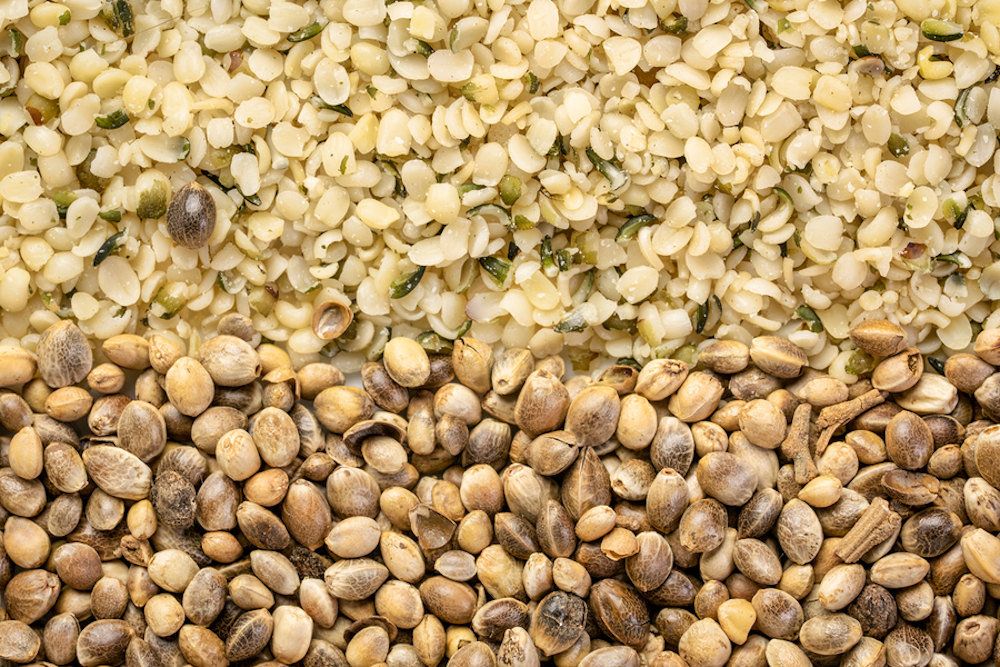
Hemp hearts, or hemp seeds, can play an important role in supporting immune health in several different ways.
For starters, hemp hearts are a complete source of plant-based protein. Your immune cells are made from protein so getting enough of this particular macronutrient is critical for healthy immune function (6).
Hemp hearts are also a rich source of omega-3 fats. Omega 3’s have anti-inflammatory properties and early research suggests they may help regulate the function and communication of certain types of immune cells (7).
Hemp hearts have a very mild, mostly neutral flavor so you can add them to almost anything. Mix them into granola, smoothies, and salad dressings. Or try baking them into a homemade batch of muffins, waffles, or cookies.
If you don’t like or simply don’t want to eat hemp hearts you can also obtain some plant-based omega 3’s and protein from chia seeds, flax meal, and walnuts.
5. Lentils

Lentils are an excellent source of a variety of immune supportive nutrients including protein, iron, folate, vitamin B6, selenium, and zinc (8).
But the main reason they’ve made it into the “top 10” list is because of their fiber content.
Lentils—and other types of legumes—are among the richest natural sources of fiber. In fact, each cup of cooked lentils provides roughly 15 grams of fiber, or about 40-60% of the daily fiber recommendation (8).
Fiber is a type of carbohydrate humans cannot fully digest. However, certain types function as prebiotics which supports the health and growth of beneficial bacteria living in your digestive tract (9).
Maintaining a thriving community of healthy gut bacteria is critical for supporting proper immune function. These bacteria work to mediate inflammation and reduce the ability of harmful, or pathogenic, bacteria to grow and make you sick (10).
Lentils are very affordable and, compared to many other types of dry beans, they’re very easy to prepare.
Try adding lentils to your favorite soups and stews, or use them as a base for a bolognese-style pasta sauce. They also make a great foundation for plant-based sloppy joes, meat balls, or shepherd’s pie.
If you don’t prefer lentils, you can obtain similar nutritional benefits from other legumes such as black beans, garbanzo beans, kidney beans, and pinto beans. Whole grains, fruit, and vegetables are also great options for boosting the fiber content of your diet.
6. Plant-Based Yogurt (and other fermented foods)

Yogurt, and other types of fermented foods, are a great way to boost your intake of probiotics in an effort to promote gut health.
Probiotics are live, active bacterial cultures found in various types of fermented foods that can support the health of your beneficial gut bacteria.
Early research suggests that probiotics may enhance immunity and reduce inflammation caused by bacteria or viruses that make you sick. There is also some evidence to suggest that having a healthy community of gut bacteria may play a role in making vaccines more effective (11).
There’s not currently enough research available to determine exactly how much yogurt you need to consume to elicit an optimal effect, though there is some evidence that roughly a cup per day can impart benefits (12).
Although yogurt is traditionally made from milk, there are countless non-dairy alternatives available made from plant-based foods like coconut, cashews, almonds, and soy.
If you don’t like yogurt, you can still get your probiotic fix from other kinds of fermented foods such as sauerkraut, kimchi, fermented pickles, vegan kefir, and kombucha.
7. Garlic

Garlic has long been used for its pharmacological potential in traditional herbal medicine practices all over the world. Historical uses include treatment of heart disease, respiratory illnesses, parasites, snake and insect bites, constipation, and bacterial and fungal infections (13).
Modern research suggests that the reason behind garlic’s apparent therapeutic potential is likely due to its rich supply of antioxidants and sulfur-containing compounds.
Several organosulfur compounds found in garlic, and other closely related vegetables, have been found to play a role in activating various types of immune cells (14).
To be clear, there is currently no evidence that garlic can effectively treat or cure any particular disease, but consuming it regularly may provide some immune support—and it tastes really great, too.
You can add garlic to almost any type of savory dish including stir fries, casseroles, soups, stews, sauces, dressings, pasta dishes, grains, vegetable sides, and more. The possibilities are endless.
If you don’t enjoy the taste of garlic, you can obtain similar benefits from other vegetables in the allium family such as onions, leeks, chives, and scallions.
8. Ginger

Ginger is a spice commonly used in a variety of culinary practices but, much like garlic, ginger also moonlights as one of the most popular types of herbal medicines in the world.
In traditional medicine practices ginger is used to treat a variety of physical ailments including migraines, nausea, arthritis, digestive disorders, heart disease, and cancer, although there’s a lack of modern research to prove its efficacy for the majority of these uses (15).
That said, ginger is loaded with a variety of unique antioxidant and anti-inflammatory compounds that may be beneficial for supporting healthy immune function in a general sense (15).
Fresh or dried ginger can be used to flavor a variety of dishes including soups, smoothies, salad dressings, and stir fries. It can also be steeped in hot water to make tea.
If you’ve got a lot of fresh ginger on hand, you can peel it, grate it, and store it in the freezer. This way you’ll always have it available and don’t have to worry about it spoiling before you’re able to use it all.
If you’re not crazy about the taste of ginger, other herbs and spices tend to be very rich sources of antioxidant and anti-inflammatory compounds, too.
Liberal use of a variety of herbs and spices in your cooking is a win-win situation. They can add flavor and a boost of nutritive, health-promoting properties at the same time.
Turmeric, cinnamon, cardamom, clove, oregano, rosemary, and thyme are all excellent options to experiment with.
9. Almonds

Almonds are a great immune-supporting food because of their rich supply of healthy fats and vitamin E.
Vitamin E is a nutrient that functions as both an antioxidant and a cofactor for a variety of essential functions of the immune system. It also helps regulate the production of free radicals and protects the fats found in cellular membranes from being oxidized (16).
A half-cup serving of almonds provides nearly 100% of the daily recommendation for vitamin E.
Healthy fats present in almonds also improve your body’s ability to absorb fat soluble vitamins A, D, E, and K—many of which are needed for healthy immune function.
You can eat almonds by the handful or add them to your favorite granola, salad, or breakfast cereal. You may also try adding a scoop of almond butter to yogurt, smoothies, salad dressings, or simply spread on toast.
If almonds aren’t your jam, you can obtain similar benefits by including a variety of other nuts and seeds in your diet such as peanuts, hazelnuts, and sunflower seeds.
10. Mushrooms
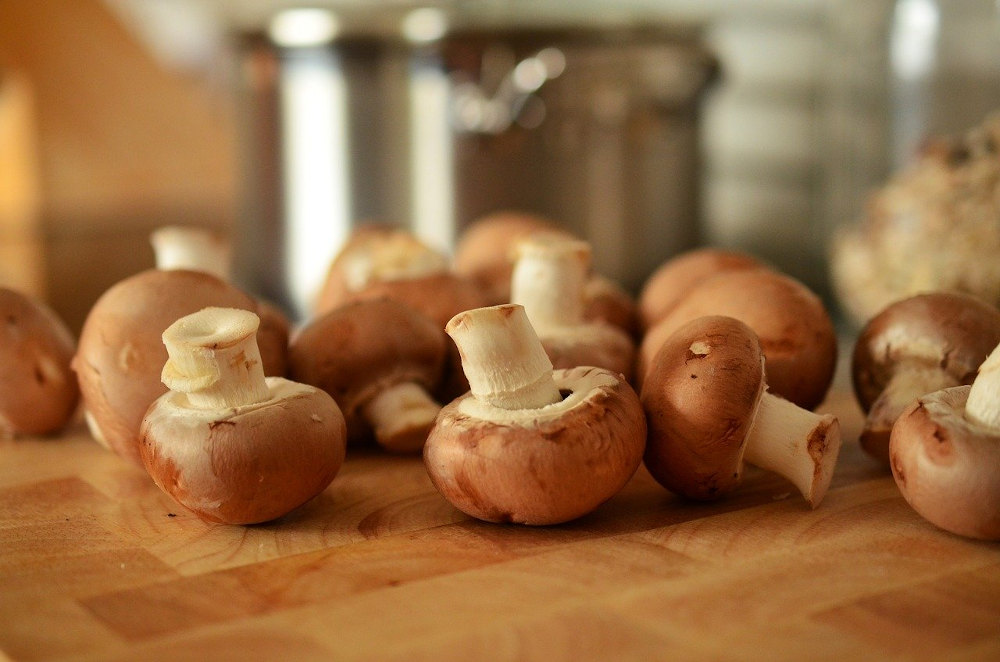
Vitamin D—also known as “the sunshine vitamin”—plays an important role in modulating certain critical functions of your immune system. Vitamin D deficiencies are also associated with an increased susceptibility to infections. Thus, making sure you’re getting plenty of this vital nutrient is a great way to support immunity (17).
The most ideal way to improve your vitamin D status is through routine exposure to sunlight. However, not everyone lives in a place with adequate sunlight exposure year round. Not to mention, frequent use of sunscreen may inhibit your body’s ability to make vitamin D. Therefore, the next best way to get more vitamin D is through your diet.
Aside from fortified foods, mushrooms are one of the only widely available plant-based sources of vitamin D. However, the quantity of vitamin D in various types of mushrooms can vary significantly.
Mushrooms are similar to humans in that they produce more vitamin D when they’re exposed to the sun’s UV rays. Thus, wild mushrooms tend to be much higher in vitamin D than those that are grown indoors (18).
That said, some commercially grown mushrooms are exposed to UV light prior to being sent to market. This process can dramatically improve the mushroom’s vitamin D content so keep an eye out for these at your local grocery store.
Because of its limited availability in plant-based foods, people following a strict vegan diet may want to consider adding a vitamin D supplement to their routine. But before you take this route, it’s a good idea to get your current vitamin D levels checked so you know the appropriate dose you should be taking.
Also keep in mind that most vitamin D supplements are not plant-based. Thus, you’ll want to check the labels or contact the supplement manufacturer if you’re not sure. Vitamin D3 is the most bioavailable form of this nutrient and although it’s usually animal-based, it can be sourced from certain types of lichen.
Consult with a registered dietitian or other qualified healthcare provider if you feel that you need assistance with choosing a supplement or establishing a dose that is right for you.
Other Tips for Supporting Immune Function
Although a diverse and nutritionally adequate diet is essential for supporting your immune system, there are a variety of other lifestyle factors that can dramatically impact how effective your immune system will be for warding off illness.
Here are a few examples:
- Stress management: Excess stress from various sources can overwhelm your immune system and make it less able to fight disease. Implementing healthy stress management techniques can really go a long way for supporting immunity.
- Alcohol and smoking: Smoking and drinking alcohol can hinder your body’s ability to fight infections. Working on reducing or eliminating these habits is a great way to get your immune system functioning optimally.
- Exercise: Regular exercise promotes the internal production of antioxidants which can help reduce stress and support immunity in a variety of ways.
- Sleep: Adequate sleep is essential for healthy immune function. Implementing good sleep habits now is a great way to keep your immune system in good working order all year long.
Does Sugar Harm Your Immune System?

Answering the question of whether sugar weakens, or harms, your immune system requires thoughtful consideration of the context of the food providing the sugar and the dietary pattern in which the food is being consumed.
Excess consumption of refined and added sugars over a long period of time is associated with increased inflammation and likelihood of developing chronic diseases, but it’s not a simple cause and effect relationship (19).
On a chemical level, sugar that comes from a blueberry and the sugar that comes from a soda is essentially the same. The basic process by which our bodies interpret and convert the sugar to energy does not radically change.
However, a blueberry provides a lot more than just sugar. It also contains essential nutrients, fiber, and antioxidants—all of which can help your body more effectively regulate the influx of sugar into the system.
Sugar that comes from a soda lacks all of the extra features that are built into a whole food source of sugar like a blueberry. It’s just sugar. This makes it much easier to inadvertently consume too much, which may ultimately lead to and increase in the production of free radicals as your body converts all of that excess sugar into fat (19).
Excess production of free radicals can contribute to increased inflammation over time, especially if other foods in the diet aren’t providing adequate nutrients and antioxidants to help mitigate the potential cellular damage and inflammation associated with the increase in free radical production (20).
For many people, over-consumption of added sugars from heavily processed foods—like sodas and desserts—also means there’s less room in the diet for essential vitamins, minerals, antioxidants, and fiber (21).
Over time, a consistent lack of essential nutrients will limit your immune system’s ability to function optimally, which may potentially contribute to an increased risk for contracting an illness.
In a nutshell, sugar in and of itself does not directly harm your immune system and you certainly do not need to be afraid of occasionally enjoying your favorite sweet treats.
However, if a large percentage of your diet is made up of refined sources of sugar or you’re routinely consuming large quantities at a time while also failing including an adequate supply of whole, nutrient-dense foods in your diet—then you are probably not setting your immune system up for the most success (21).
When it comes to nutrition, there is no “one size fits all” approach and it’s important to keep the big picture in perspective.
For the most immune-supportive benefits, moderate your intake of added sugars and prioritize routine consumption of a variety of whole food sources of nutrients from each food group.
The Bottom Line
The human immune system is complex and requires a variety of nutrients to function optimally and there is no magic food, nutrient, or supplement with exceptional immune “boosting” capabilities.
Instead, the best way to support your immune system is to routinely include a wide variety of whole foods that contain all of the essential nutrients your body needs to thrive.
Pairing a well-rounded diet with plenty of exercise, good quality sleep, and stress reduction techniques will help you stay well all year long.
Feature photo: ©bit24/Bigstock

